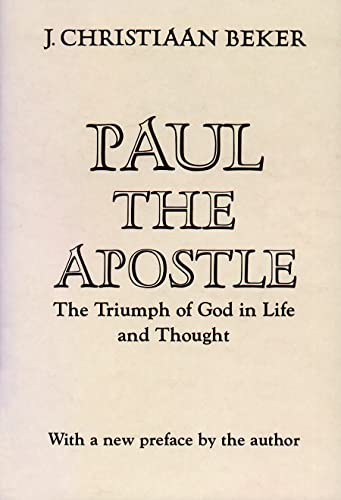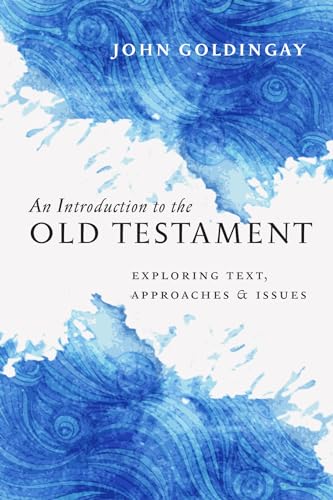Paul the Apostle: The Triumph of God in Life and Thought
Written by J. Christiaan Beker Reviewed By Max TurnerDespite the title, this is not a historical or theological appraisal of Paul’s ministry; it concentrates almost exclusively on the structure of Paul’s thought. Beker is critical of most contemporary Pauline scholarship at two fundamental points. Firstly he feels that modern study too often misrepresents Paul’s hermeneutic: that is, the relationship between the coherent centre of Paul’s gospel and the concrete bringing-to-speech-of-the-gospel as a word on target for the specific historical circumstances addressed by each individual letter. Secondly, he feels that (as a result) most scholarship has failed properly to identify the true centre of Paul’s gospel.
The first criticism amounts to this: Beker brings forcefully to our attention that Paul does not offer his readers the relevant extracts of the current edition of his Systematic Theology which we might then collate and reconstruct under such headings as ‘God’, ‘Man’, ‘Salvation’ etc.—Paul wrote no such Dogmatics either on papyrus, nor on the pages of his mind. The contents and structure of argument of each letter (including Romans) is totally determined rather by the interreaction between the coherent centre of Paul’s gospel and the contingent circumstances which he addresses. Paul’s theological emphases shift dramatically—sometimes in contrary directions—as he faces different situations, and so much of what he says is circumstantially determined. The task of the interpreter is first of all to allow for the dramatic effect of Paul’s contextual argument. This Beker illustrates in chs 4–6 of his book in which he analyses the quite different ways Paul handles the themes of Abraham, faith and Torah in Galatians and Romans. (In the former, Beker argues, Paul reacts to hard nomism by driving a wedge between Abraham and Torah: faith and sonship had to await the coming Christ (and Christians). Thus in this letter Paul emphasizes the discontinuity between Torah-Judaism and Christ, and the law of Moses appears in an almost demonic role. Romans by contrast addresses the problem created for the Jewish view of God’s righteousness by the inclusion of Gentiles in God’s people, and by the rejection of the gospel by Israel. Here Paul stresses continuity between Judaism and Christianity in Abraham’s faith: his ‘seed’ is no longer Christ (and those in him) alone, but all who have believed as Abraham did; whether pious Jews (before Christ) or Christians. And here too, Paul says what he could not say without further ado in Galatians—that Christ establishes the Law (3:31), even though he is also its end (10:4). Certain points of Beker’s description may need revision, but his methodological approach is right. Paul’s argument in his epistles is squarely aimed at specific problems—it is dialogical; he does not offer extracts from a timeless systematic theology. So the surface meaning of his theological assertions are not always readily harmonizable: harmony belongs rather at the level of the deep structures of what he says.
This leads to Beker’s second criticism. Most exponents of Paul, he claims, seek the centre of Paul’s thought in e.g. ‘jusfification by faith’ (Luther), ‘in Christ’ (Schweitzer), ‘righteousness’ (Käsemann), ‘reconciliation’ (Martin) etc.; but these are really merely the secondary symbolisms belonging to the surface structure of what the apostle says. Together they indeed witness to the primary symbolic structure, but individually they are but aspects of Paul’s application of the core of his gospel to the contingent needs of a particular situation. The primary symbolic structure of Paul’s gospel is the resurrection of the crucified Christ, understood as a apocalyptic event: ‘I posit the triumph of God as the coherent theme of Paul’s gospel; that is, the hope in the dawning victory of God in the imminent redemption of the created order, which he has inaugurated in Christ’ (ix).
There is little new in Beker’s assertion that Paul’s theology modifies the apocalyptic two-age structure, has cosmic overtones and expects an imminent end. What is less familiar is his insistence that this is the indispensible core of Paul’s gospel: the apostle imposes it on his readers against any hellenizing or spiritualizing understanding of the gospel in terms of death and resurrection with Christ (1 Cor. 15: cf. Beker, ch. 8). From this bridgehead Beker mounts his offensive on Dodd (for collapsing apocalyptic into history), on Bultmann (for collapsing it into anthropology), on Käsemann (for reducing it to ‘righteousness’) and on Barth and Cullman (for spiritualizing apocalyptic into Christology). Further chapters examine major themes in Paul to show that they too are expressions of Paul’s fundamentally apocalyptic gospel: thus, the death of Christ is not merely a moral issue, but has apocalyptic scope as victory over the ‘powers’ ranged against man (chs 9 and 10); the dawn of new creation. Similarly with Paul’s understanding of ‘righteousness’, ‘grace’ and ‘freedom’ (ch 12), themes which—with Paul’s ‘in Christ’ language—have too often been spiritualized or reduced to ‘realized eschatology’. The apocalyptic nature of Paul’s theology is further evinced in his understanding of the Spirit as the earnest of redemption, in his characterization of our present existence with the tag ‘this mortal body’ (rather than ‘this body of sin’ (pre-Christian existence) or ‘the spiritual body’ (post-resurrection existence), and in his portrayal of the church as the dawning of the new age (not the kingdom itself: ch 14). Once again some of the themes are familiar—especially to those brought up on Ladd, Ridderbos or Dunn; but new is the sheer depth of analysis and combination of themes, together with rigorous contextualization of Paul’s arguments.
Beker is very widely read, and an astute critic of the secondary literature on Paul. In a book of this scope there are bound to be critical and theological judgments on every page from which some readers (not excluding the reviewer) would wish to demur. In addition the following criticisms need to be voiced:
- Beker’s thesis is well supported by 1 Corinthians and Romans, and—allowing for what Beker regards as Paul’s own ability to deal with the problem of the ‘delay’ of the parousia—perhaps by 2 Corinthians and Philippians as well. But Beker has to admit that in Galatians the Christocentric nature of the argument forces the apocalyptic theme to the periphery (p. 58). From this Beker deduces that Galatians cannot serve as the central and normative guide for Paul’s letters and theology. Perhaps so, but might it not equally well be taken to indicate that the theocentric apocalyptic theme is not the sole centre of Paul’s theology? Beker accuses Cullmann of collapsing apocalyptic into Christology, but the evidence of Galatians suggests that Beker is in danger of the opposite, of swamping Christology with apocalyptic. Indeed it is noticeable that he has hardly any serious account of Christology in his whole work; no chapter, or even major section, is devoted to the subject. This is inadequate as an account of Paul’s theology. Beker’s position needs modifying. The apostle’s gospel is not so much a circle with one centre, as an ellipse with two foci: Christology and an apocalyptic understanding of the Christ-event respectively. This leads to our second criticism.
- Beker constantly contrasts Paul’s apocalyptic gospel with that of other New Testament writers. Colossians and Ephesians (which Beker regards as psuedo-Pauline) have collapsed Paul’s apocalyptic into ‘realized eschatology’; John has spiritualized it, Luke and the Petrines have delayed the apocalyptic hour, and so on. These Beker sees as incompatible with the true Pauline gospel (though he admits that Paul could delay the hour too). But if Beker is to convince us he must show us why Galatians can be accepted as a circumstantially determined emphasis on the realized component of eschatology in Paul’s gospel, while Colossians must be rejected as a distortion of that gospel. Could one not envisage circumstances at Colossae which required an even heavier emphasis (than in Galatians) on what we have already in Christ; even a willingness to say we are already raised with Christ—at least spiritually, in our union with him? Are all such spiritualizations (even metaphors) necessarily perversions of Paul’s thought—cf. Galatians 2:20; Romans 6:13? For at least some students of the New Testament (e.g. Ladd) it is possible to understand most or all of the New Testament writings (not merely Paul’s) as circumstancially determined variations of the one fundamentally apocalyptic gospel. Certainly the reviewer felt that Beker was often a good exponent of Paul, but a less than fair one of the other New Testament writers.
- Beker seems to feel that his reconstructed Pauline gospel stands at the heart of authentic Christianity. The other New Testament writers and Paul’s modern exponents alike have departed from it. But how can this canon within the canon be justified—especially in view of Beker’s own allegations that the rest of the New Testament writers variously abandon or contradict Paul’s gospel? If the deep structures of Paul’s gospel are truly denied by the rest of the New Testament, what authority or relevance can either Paul, or those other authors, have for us today?
Despite these criticisms the book must be said to provide magnificent analysis of the apostle’s thought, and to be destined to take its place as one of the classic works on Paul.
Max Turner
London Bible College






